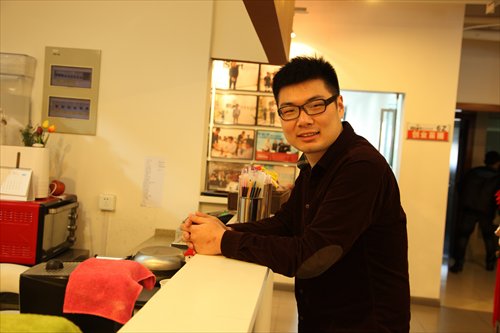The tycoon graduates
Why student entrepreneurs struggle in Shanghai

Young entrepreneur Wu Yongzhou Photo: Xie Jun/GT
Young entrepreneur Zhu Yubo Photo: Xie Jun/GT Young entrepreneur Chen Kai Photo: Xie Jun/GT
This should be a good time to start a new business - especially if you are young. Earlier this year, the Chinese government stressed that China has to promote entrepreneurship to keep the economy growing and, on March 29, the Shanghai Public Entrepreneurship Space League was launched with nearly 90 companies and organizations joining. Entrepreneurs seeking financial support or advice will be supported by the league.
But for all the famed business acumen of the Chinese, the younger generation seems reluctant to start businesses. According to government figures, only 1 percent of Chinese university students start their own businesses. "There are many myths about student entrepreneurs such as Steve Jobs and Mark Zuckerburg," one investor told the Global Times. "Chinese students are fans of these people, but they don't do the things their idols do."
Others suggest that to become a Zuckerburg, Chinese students need to have a wealthy family and loads of support.
Access to resources
Cha Li is an angel investor (angel investors finance start-up companies in exchange for equity or convertible debt). He is also the CEO of iStart, an entrepreneurship incubator and he told the Global Times Shanghai was certainly the best city in China and possibly the world for a young person to start his or her own business. "In Shanghai, young entrepreneurs have access to resources you can hardly dream of in other cities."
One of these resources is the Shanghai Technology Entrepreneurship Foundation for Graduates (EFG). It was launched in 2006 and its goal is to help student entrepreneurs. In its nine years, the foundation has created a comprehensive network with schools, universities and investment units, to help young entrepreneurs. The practical assistance includes two funds and events like the Global Entrepreneurship Week China and the EFG entrepreneurship training camp.
Huang Guanyi, the project supervisor at the EFG, told the Global Times that not just college students were eligible to apply for EFG funds but anyone who had graduated up to five years previously was also eligible for financial aid. From August 2006 to February 2015, the EFG has examined 4,148 business proposals and sponsored 1,080. Almost half of the proposals came from students still at university.
"We sponsored 69 projects in 2011, 100 in 2012, 188 in 2013 and 239 in 2014. So you can see the number of projects we sponsored has been rising over the years. Of course, the number of applicants has also increased year after year," Huang said.
To date there have been several success stories - like Huo Rong Science and Information, a game development company with an initial registered capital of 100,000 yuan ($16,101). In 2014 it was purchased by a listed company for 810 million yuan.
Investor Cha said he preferred dealing with student entrepreneurs rather than older entrepreneurs - "students don't care about rules and regulations." One of the student entrepreneurship teams he had invested in, a food-ordering website called Are You Hungry, stunned him with their application.
"When I first talked to them, they told me their website had 2,000 orders a day. Then I asked them how many daily orders they expected to achieve by the end of that year. My experience told me that 10,000 orders would be the most possible. But they said 100,000. A mature person with work experience would have said an extraordinary increase like that would be out of the question. But these young students were daring, and they managed to make that happen just as they anticipated."

Social values
But with all the support being offered has China become a paradise for young entrepreneurs? Statistics say not yet. Figures from China's Ministry of Human Resources and Social Security show that only 1 percent of Chinese university students are starting their own businesses as opposed to the 20 percent student entrepreneurship rate in the US.
"It's a matter of social values," said Cha. "We don't encourage young people. We tell them business is hard and they can't make it at such young age."
Cha talked about one talented student he had met years ago at an iStart entrepreneurship contest. The student from Guangxi had a brilliant business plan. "I told him I didn't want shares but I wanted to give him the initial capital right now. I suggested he drop out of school and start putting his business idea into practice. But that night he caught the train back home and went back to school.
"I have spoken about entrepreneurship at universities and colleges and the audiences are always enthusiastic when they discuss this or ask questions. But at the end when I ask if anyone wants to start their own businesses, there's always complete silence."
Once a student entrepreneur himself, Cha saw primary school students in the US starting their own businesses. "In China, however, young people seem to be ashamed of their age. Many student entrepreneurs try to look older, wear mature-style clothes and even grow moustaches when they approach venture capital investors."
It could be a Shanghai problem as well. Zhu Yubo, the 24-year-old CEO of Shanghai Azusa Information Technology Co.,Ltd told the Global Times that there were fewer young entrepreneurs in Shanghai than in cities like Beijing and Shenzhen. "I am the youngest entrepreneur at the EFG, but I know quite a few Beijing-based entrepreneurs who are younger than me. One of them, who has a brilliant body-building business program, is just 20.
"In China, you've got to meet a few requirements if you want to be a student entrepreneur. First, you've got to have a sound business idea. Second, you should have a comfortable or affluent family. Third, your family should support your idea. It's very rare to find students in Shanghai who can meet all of these requirements. In Shanghai, the flourishing areas are finance and services. Why? Affluence and security are two of the most prized values in Shanghai but these run counter to the spirit of entrepreneurship."
Family involvement
One practical reason for family involvement is that young entrepreneurs who have family support can persist with their dreams for longer than those without support.
CEO Zhu counts himself as one of the lucky ones who had parental support. When he was a senior student at the East China Normal University his business idea for computer hardware was approved by mentors who went on to sponsor him. He formed a team with his university roommate and a high school friend.
And his parents were very supportive. "Although they are from a working-class community, their salaries are above average for their hometown. So my family has no financial problems. Besides, my father has an open mind. He always told me: 'If you want to do something, do it. If you fail, all you can lose is time and money.'"
Zhu said that his parents' support was very important. "If my parents hadn't supported me, I would have given up. Running a business is very demanding. I don't think I could handle the double pressure from work as well as family."
But he learned that running a company often means a life of uncertainty. "I had always wanted to get married before 25 so I could be a young father. Even at the early stages of my business I had not given up that dream. But later, when I really experienced setbacks, I understood that life as an entrepreneur is risky. Nowadays, if anyone who doesn't have financial and emotional support from their family asks to join my team, I recommend that they find a stable job elsewhere."
Wu Yongzhou, a young entrepreneur from Jiaxing, in Zhejiang Province, who runs a WeChat app for couples who have split and want a new relationship, started his own business after graduating. "There is a tradition of entrepreneurship in my family. In fact, my mom complains a little about my father not having his own business and not being able to make a lot of money. After I graduated, one of my uncles started a business selling Internet fax, and naturally I became his partner."

Deadlines ordered
But family involvement often means the student entrepreneurs will have to surrender their business dreams. EFG's Huang said that many of the EFG-backed entrepreneurs couldn't take the negative pressures from their parents. "Some parents give their children a deadline, one year or two. After that, they order them to get a job or get married. And usually, the children obey."
Even with support from family and friends, running a business is never easy. Almost all the entrepreneurs the Global Times talked to admitted they had had to endure at least one serious failure on the way to success.
Chen Kai, CEO of Jiang Rong Xing, a popular Shanghai restaurant chain, told the Global Times that he started his business career as a furniture supplier after he graduated from Tongji University. He and some schoolmates set up a furniture factory in Nanhui. However, the factory collapsed soon because of bad management.
"I had a lot of debt. My schoolmates all left me. In those days I just hung around the empty factory, slept on a bed there and asked myself 'how come things turned out like this?' But actually, instead of feeling bad, I was quite excited."
Later, he decided to try catering. To understand how restaurants were managed, he worked in a snack shop for a long time, making dumplings and washing dishes. Eventually he set up Jiang Rong Xing.
Three years ago he wanted to try opening a Thai restaurant. He posed as a regular customer at a popular Thai restaurant for two years. "Every night at 10 pm, I went to that restaurant and ordered three courses. Two years later the manager came and began talking to me. I persuaded him to fly back to Canada and invite a famous Thai restaurant chain to come and open branches in China.
"I didn't care about setbacks. I had my ambition, which was to earn about 3 million yuan five years after graduation. I couldn't do that if I didn't have my own business."
Losing a dream
Likewise, Wu Yongzhou also failed in his first undertaking. His Internet fax company collapsed and all the employees were laid off. "When the employees were laid off they were sad because they lost their jobs. I was heartbroken because I lost my company and my dream."
Despite the heartbreak Wu stayed calm. One of his business heroes was Xu Chaojun, who worked as the technical director at sohu.com. "Xu had set up websites like diandian.com and papa.com but they weren't very popular. However he never gave up. It was this perseverance that made me admire him".
Now when he returns to his hometown his friends tell him that he is the only one who hasn't given up on his dream.
Zhu is also persevering. Right now he is developing an Internet app with his team. For 2014 he had only two weeks holiday and worked until midnight almost every day. "I want to get to the end of this even though the end might mean failure. If I fail, I will tell my friends why I failed and gain the experience. But I won't give up before there's a result."